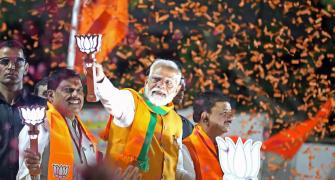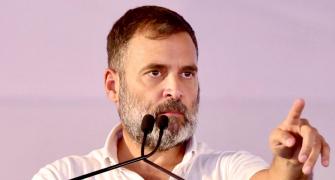"Our hope is that we keep the backlog down and we will pull all stops to do so," Mulford said in New York on Sunday while briefly addressing the Asia Society's second annual conference on India's financial markets.
"I would like to confirm for the benefit of many of you here that the waiting period for an American visa appointment in India is now a maximum of six days,' Mulford told the gathering of investors and bankers.
"For those of you who come from India, or who have have many relatives in India - because as my wife says when you travel around India you find out that it is all about visas really - I am feeling good today about being able to say that the Indian public no longer has to sit in waiting rooms and see six empty booths and wait for six months for an appointment. That is going to help America's image in India," Mulford said.
The delay in visa appointments and restriction on the number of visas have been a cause of concern among Indians, particularly among the major IT companies in India.
The issue was highlighted this week by Azim Premji, chairman, Wipro, during a reception hosted by the South Asian Journalists Association.
"As far as liberalisation is concerned in the West, it is a one-way traffic. I think if the West gets into the protectiveness, particularly as the US is doing with visa restrictions, it will get reciprocity of dealings from the Indian government," Premji had said. "This is a negative trend that is happening."
At the conference that was headlined by Finance Minister P Chidambaram and addressed by Planning Commission deputy chairman Montek Singh Ahluwalia, the US ambassador paid tributes to what he called was India's world-class economic leadership.
"I think it is clear that India has the benefit and blessings of world class economic leadership. I would like to cite Montek (Singh Ahluwalia) who is one of the great representatives of that group today," Mulford said.
"The country is fortunate, the world is fortunate to have that quality of leadership and I think this helps India move forward," he said.
"For the US it is important because it enables us to deal on a very straight up basis with people who first of all understand the economic reality and have an open mind and willing to listen and share views and ideas with which we have developed very strong mutual interests," Mulford said.
"Perhaps, one evidence of that is the success of the CEO forum, which is an absolutely unique creation. It functions on its own, is not controlled by the governments. We hope overtime it will be an avenue and a means of communicating important ideas in a world where ideas absolutely are keys to engineering changes," Mulford said.
Mulford said that there are some constraints down the road in India's growth vision as unfolded at the conference, the first one of them being energy. "We hope the civilian nuclear cooperation agreement will help," he said. The other constraints, he said relate to infrastructure development and agricultural reform.
"Agricultural reform in my opinion may turn out to be the great test because you do not globalise part of a country. When you start down the globalisation road you ultimately have to face the entire country and its implication," he said.
"Agriculture as you know is rather a drag on the overall performance of India today. The question is how that sector can be brought forward both economically and also politically because India after all is one the world's great democracies. And people vote every five years and sometimes you can see how surprising the results are like in May 2004," he said, obviously referring to BJP-led government's defeat in elections which many attributed to its complete neglect of farmers.
"So it is an area of extreme importance. Each of them is touched by financial market reforms and banking reforms. This is a major macroeconomic reform issue in India and it touches every area in a very fundamental way," he said.
"The current link between the stated policy and the pace and result of reforms is really wide today. India needs to move on reforms pretty quickly," Mulford said.






